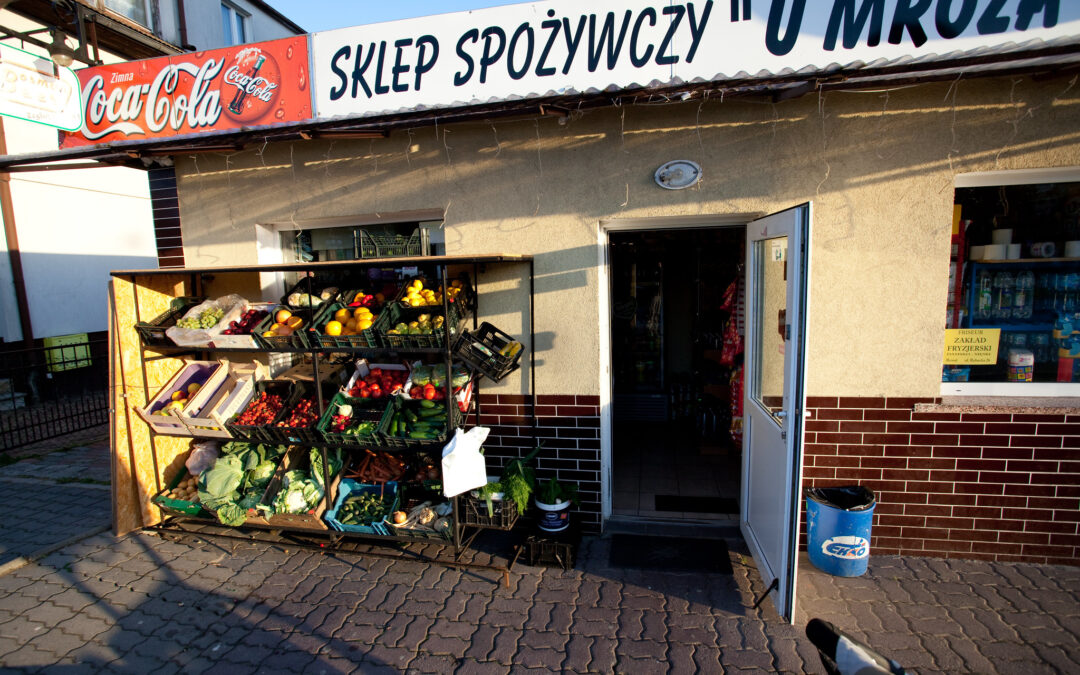By Mateusz Perowicz (published in cooperation with the Jagiellonian Club think tank)
The decision to ban trading on Sundays in Poland triggered a widescale debate on the reasons and consequences of its introduction. One of the positive outcomes was supposed to be an improvement in the situation of small and medium-sized shops, which were threatened by the expansion of large supermarkets. Yet the policy has been devastating. The big chains are even bigger, while there are fewer and fewer alternatives.
Better ban than reform
Since the Sunday shopping ban was introduced, some 6,500 shops have vanished from the Polish business map – most of them the small and local enterprises that were supposed to benefit from the change.
“Now everyone does a big shop on Friday or Saturday and no longer buys anything on Sunday,” Anna, the owner of a greengrocer’s in the Bielany district of Warsaw told Money.pl. “And if they need anything, they go to Żabka or another small chain. Here on the estate on Sunday there are queue in front of the three Żabkas. But they have alcohol and cigarettes there – I don’t.”
Almost a third of Poland’s population now lives within 300 metres of a Żabka convenience store, over 7,200 of which dot the country@mariawilczek looks at the rapid rise of the chain – whose name means “little frog” – as well as the criticism it has faced https://t.co/Qb1aPFyONo
— Notes from Poland 🇵🇱 (@notesfrompoland) July 1, 2021
“This retail segment was the most severely affected in 2020,” notes Money.pl, citing data from Nielsen. “As many as 1,670 small shops went bust. This fact is all the more painful for the industry because the number of all shops in the country fell by 1,800.”
As a result, the number of retail outlets today is estimated at 99,400. When the Sunday trading ban was introduced in 2018, there were almost 106,000. The largest decline was recorded in 2019 – when 4,600 shops closed.
If this solution was meant to increase the share of Polish capital in the food market, evidently something went wrong. It is not just that the number of small businesses has fallen, but also the largest chains have found a solution to the new situation and are operating on Sundays without any problems.
Even worse, most existing Polish retail chains have been absorbed by foreign companies. The Piotr i Paweł and Alma supermarket chains are gone. Outlets belonging to the two companies have been taken over by the Lithuanian company Maxima, while Eurocash has applied to acquire the Arhelan group.
The effect is crushing: none of the ten biggest retail chains in Poland have Polish capital. Of course, the Sunday trading ban was not the main cause of this situation, but the idea was to reverse this process. It was supposed to create an obstacle for the large chains and an opportunity for small businesses. The reverse effect has occurred, and small companies are vanishing.
We therefore have a ban that in practice does not work and gives rise to significant consequences, not only economic. It means that society is getting used to breaking and getting round the regulations. A law that is full of holes, weak institutions and creativity in circumventing regulations are becoming an element of everyday life.
The ban has not improved the position of Polish companies, then, and has not helped create genuine alternatives to big foreign corporations. These alternatives are much easier to find on the internet. The pandemic has only hastened the dynamic development of e-commerce.
A similar story in e-commerce
In the first quarter of 2021, there were 2,000 new internet shops, 70% more than in the same period last year, reports Bankier.pl. Some 46,500 online shops are now registered in Poland.
According to research by PwC, by 2026 the value of Polish e-commerce will reach 162 billion zloty (€36 billion), meaning an average annual growth of 12%. Online shopping is becoming an enclave for small and medium-sized companies, free of many of the dishonest and onerous practices that often trouble suppliers. Gazeta Wyborcza, in a report titled “Hypercommerce: how commercial chains ruin their suppliers”, quotes one business owner who complains:
I’ve paid supermarkets a turnover bonus, an annual premium on net income, I’ve contributed to the marketing budget, display of goods, leaflets, the shop’s birthday, care for the shelf, logistical and transport services, special events, and the opening of a new shop.
Is going online, where one can form direct relations with the customer, enough to get away from all these impositions? At present yes, but realities are changing fast.
“In Poland this problem is not all that clear yet, but it will no doubt appear when foreign platforms start to dynamically enter the Polish market,” warns Tomasz Janik, president of the Polish Business Society.
“The experiences of other markets, including the American one, show that such platforms monopolise sales. For around 40% of companies selling in e-commerce this is their only income source. It is hard to compete with a platform with a full database and information or which products sell and how they are positioned,” he adds.
Janik points to one worrying mechanism. “Introducing competing products under one’s own brand has a direct effect on positioning. It creates a threat for the sales of small and medium-sized businesses. The algorithms set up in systems prefer own products. This element needs be regulated so that we have equal access to distribution channels. We know very well that large platforms monopolise the market, and the monopoly rebounds onto consumers.”
A 450-page US Congress report, Investigation of Competition in Digital Markets, also leaves no illusions, describing a number of monopolising practices employed by the biggest companies. The same phenomenon has arrived in Poland, where the biggest global e-commerce market players are carving out a place for themselves.
Pepsi or Coke?
It is good to have a choice and be able to decide what product or service we want. Sometimes, however, this choice might be limited. Making access to what the competition offers is not in the interest of any company, which why some small shops and restaurants will only have either Pepsi or Coca-Cola on offer.
Technological development is encouraging the practice of attaching a consumer to specific products or services and raising the bar for transferring to the competition. The streaming platform market shows this very clearly.
At first, you used to be able to find everything on Netflix. More recently, however, almost every studio has created its own streaming platform. After all, such major investments need to pay for themselves – so this was a natural consequence.
Some 130 titles recently disappeared from Netflix in Poland, including the Batman and Harry Potter films and Friends. Warner Bros had just launched its own platform in the country. Disney’s platform is not yet available in Poland, but it has already removed its contents.
This is just the beginning. At present we can still access many different platforms as people share access. Such practices are now regarded as piracy 2.0, however, and solutions to curtail them are now being tested.
The Inpost parcel lockers, a Polish success story owned by Rafał Brzoska, are like Netflix five years ago. Everybody wants to put their contents there to change consumer trends and habits.
Consumers have grown accustomed to online shopping being easy and comfortable, while companies are getting used to the fact that it has become impossible to function without an online shop. However, many big players have already announced investments in their own, alternative infrastructure.
Poland's biggest parcel locker operator has launched an app offering to deliver groceries within an hour as it aims to build what it says will be the country's "largest nationwide food marketplace" https://t.co/z5HjrW3m5o
— Notes from Poland 🇵🇱 (@notesfrompoland) July 6, 2021
Small Polish businesses struggling to compete
What can we expect to see in a few years’ time? Will we be able to collect purchases from an online shop from a parcel locker belonging to its competitor? Will there be exclusive contracts and limited availability of some products? Will Amazon’s own brands be available on AliExpress, since the Biedronka supermarket’s products are not on sale in Lidl?
What will be the position of small and medium-sized Polish companies? If producers have to contribute to the upkeep of shops by paying for shelf care, perhaps there will be similar costs for display on a website?
Polish small and medium-sized enterprises face many challenges. The scale of the problems they struggle with in brick-and-mortar shops could be even larger in the online space. On the one hand, American algorithms with the potential to create a monopoly, and on the other, Chinese expansion and often dishonest practices. This prompts the question of whether Polish public institutions are capable of adapting to such a rapidly changing situation.
Since 2010, the maintenance costs of Poland’s Office of Competition and Consumer Protection have doubled, from 50 to 101 million zloty. This proves that an efficient and subjective state is not cheap. The office is acquiring new competences and proving increasingly adept at enforcing the law. Poczta Polska, the national postal service, is also reorganising.
The impending changes on the e-commerce market, however, mean that even greater outlay is needed on these and other institutions. The results reported by the National Labour Inspectorate in the battle against instances of breaking the Sunday trading law are hardly optimistic.
Without adequate preparation, such insignificant and ineffective decisions as this ban will be all the Polish state is capable of.
The original Polish version of this article can be found here. Translated by Ben Koschalka
Main image credit: Stefan Kellner/Flickr (under CC BY-NC 2.0)





















